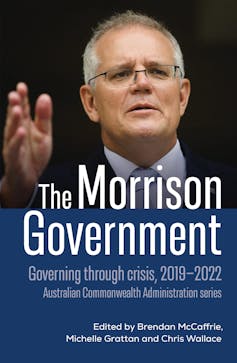the 'disastrous' Morrison government dissected
- Written by Dennis Altman, VC Fellow LaTrobe University, La Trobe University

Almost a year after the victory of the Albanese government, the defects of its predecessors are increasingly obvious. The competence and teamwork of the current government underline the weaknesses of the Morrison regime. The contrast between the two styles of leadership reminds us that bullying is no substitute for collaboration and empathy.
Review: The Morrison Government: Governing Through Crisis – edited by Brendan McCaffrie, Michelle Grattan and Chris Wallace (UNSW Press).
Future historians will probably be most struck by the impact of COVID during those years, and the extraordinary effect the epidemic had upon everyday life. In The Morrison Government: Governing Through Crisis[1], there are two chapters on the government’s response to the epidemic: one by Stephen Duckett in the policy section, and the other by Mark Evans and Michelle Grattan on the role of experts and democracy.

















